AN ERROR IN COMEDY
One of Shakespeare’s earliest plays, The Comedy of Errors, is also his shortest and most farcical. In fact, while scholars argue over the classification of other Bard works, there is no denying that this play belongs to the category of Comedies: the tale of two sets of separated twins is not only full of slapstick, rampant with rhyme, jam-packed with puns, and replete with mistaken identities – it is the Bard’s only play with “Comedy” in the title.
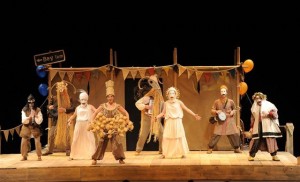 Yet comedy is the one thing mostly missing from the Shakespeare’s Globe Theatre production now visiting the beautiful Broad Stage. This revival from London (with a different cast) tries to be both silly and classical, but the affair ends up falling through the cracks of its own premise and becomes a series of missed opportunities making the overall experience both lulling and dull.
Yet comedy is the one thing mostly missing from the Shakespeare’s Globe Theatre production now visiting the beautiful Broad Stage. This revival from London (with a different cast) tries to be both silly and classical, but the affair ends up falling through the cracks of its own premise and becomes a series of missed opportunities making the overall experience both lulling and dull.
The conceit of this production is that eight actors portray some sort of caravan of players who will be taking on over 20 roles. It’s a promising premise whereby the actors can be confused themselves when it comes time to switch a hat or make an entrance, but it is used to ill-effect. The attempt at Burlesque humor lacks timing and true, knock-about clowning (it is more manic than anything else), and quite a few actors employ straightforward, classical interpretations of the text with minimal character development, as if they were reciting sonnets.
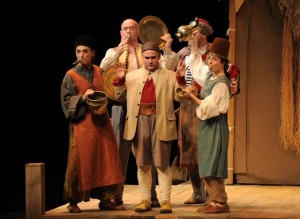 The Comedy of Errors is based on the works of Roman playwright Plautus, considered to be the inventor of low comedy. Interestingly enough, the design on hand mimics what we may have seen in Plautus’ time: Rome was not known for permanent theaters; thus, actors would perform outdoors on an elevated platform with a limited playing area, creating an initmacy that Romans preferred. But director Rebecca Gatward has not placed us in Rome.
The Comedy of Errors is based on the works of Roman playwright Plautus, considered to be the inventor of low comedy. Interestingly enough, the design on hand mimics what we may have seen in Plautus’ time: Rome was not known for permanent theaters; thus, actors would perform outdoors on an elevated platform with a limited playing area, creating an initmacy that Romans preferred. But director Rebecca Gatward has not placed us in Rome.
From the back of the house at the Broad theatre come eight performers inviting us to see their play, which will mostly be done on a stationary platform. Liz Cooke’s scenery and costumes suggest the 1920’s, but it is unclear whether we are in Northern Africa or Turkey. Wherever we may be, a canvas tent, fezzes, turbans, and sandals suggest a Mediterranean country under British colonization, but what company would use an accordion and clarinet? To add to the confusion, the actors wear strange masks at the opening, but these disguises – which depict a hybrid of African animal rituals and Greek Theatre – were not to be seen again!
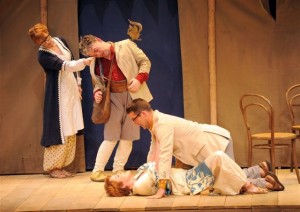 The entire company of Shakespeare’s Globe Theatre is meticulous in their projection, enunciation, and interpretation of text, a refreshing respite from the dearth of classically trained actors in Los Angeles. However, what makes this Bazaar-like setting truly bizarre, for the most part, is that Gatward has not instructed her company to develop distinct physical and character traits, especially the women: Laura Rodgers as the tough wife Adriana, Dana Gartland as her sister Luciana, and Emma Pallant doing double-duty as a Courtesan and the Abbess, merely portray thespians portraying characters, occasionally adding wisps of differentiation, such as dialect. Plus, the women were simply not funny.
The entire company of Shakespeare’s Globe Theatre is meticulous in their projection, enunciation, and interpretation of text, a refreshing respite from the dearth of classically trained actors in Los Angeles. However, what makes this Bazaar-like setting truly bizarre, for the most part, is that Gatward has not instructed her company to develop distinct physical and character traits, especially the women: Laura Rodgers as the tough wife Adriana, Dana Gartland as her sister Luciana, and Emma Pallant doing double-duty as a Courtesan and the Abbess, merely portray thespians portraying characters, occasionally adding wisps of differentiation, such as dialect. Plus, the women were simply not funny.
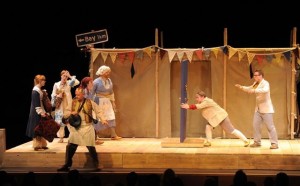 The sets of twins, often played by four actors, is here played by two brilliant farceurs who show us what they are capable of physically, such as prat-falls and double-takes, but the line deliveries lacked precision and razor-sharp reactions. Bill Buckhurst plays both Antipholuses and Fergal McElherron plays the Dromios, the servants to these two masters. Having seen this play often, it never occurred to me to question why Shakespeare never addresses how both sets of twins ended up with the same names. Most likely, it didn’t matter to Elizabethan groundlings, who found slapstick beatings funny in their own right. Even with whistles and cymbals accompanying each head-smack, the boys, with the rest of the cast, seemed like they were working overtime for laughs.
The sets of twins, often played by four actors, is here played by two brilliant farceurs who show us what they are capable of physically, such as prat-falls and double-takes, but the line deliveries lacked precision and razor-sharp reactions. Bill Buckhurst plays both Antipholuses and Fergal McElherron plays the Dromios, the servants to these two masters. Having seen this play often, it never occurred to me to question why Shakespeare never addresses how both sets of twins ended up with the same names. Most likely, it didn’t matter to Elizabethan groundlings, who found slapstick beatings funny in their own right. Even with whistles and cymbals accompanying each head-smack, the boys, with the rest of the cast, seemed like they were working overtime for laughs.
One scene has the duo of twins on stage at the same time. Gatward cleverly has Buckhurst and McElherron racing wildly back and forth between a swinging door, taking their glasses on and off with rapidity. It certainly was the most engaging moment for the audience, who laughed wildly at the physical humor, but the manic concept trumped the storytelling, as the breathless company did not hold for laughs and much of the dialogue was unintelligible.
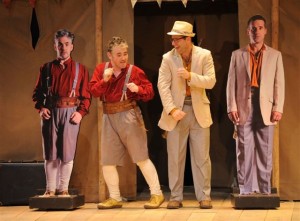 Ultimately, the small cast and nominal set suggest that Shakespeare’s Globe Theatre, under the artistic direction of Dominic Dromgoole, assumed that – along with their name and prestige – a cost-effective production of a breezy comedy would be a great way to break even, if not make money outright (tickets average $65 to $135). It is as if the Globe is insinuating that American audiences are too low-brow for anything but highly accessible comedies. (The Globe’s Merry Wives of Windsor was far more effective because it did not rely on shtick for laughs.)
Ultimately, the small cast and nominal set suggest that Shakespeare’s Globe Theatre, under the artistic direction of Dominic Dromgoole, assumed that – along with their name and prestige – a cost-effective production of a breezy comedy would be a great way to break even, if not make money outright (tickets average $65 to $135). It is as if the Globe is insinuating that American audiences are too low-brow for anything but highly accessible comedies. (The Globe’s Merry Wives of Windsor was far more effective because it did not rely on shtick for laughs.)
Yes, the Globe in England is unfunded by their government and offers educational programs and affordable ticket prices, but this production will not help their publicity as a world-class classical theater company. It should be a wake-up call to those who believe that great interpretations of Shakespeare belong only to the British: in the last year alone, Los Angeles saw two amazingly funny interpretations of Errors, one at The Los Angeles Theatre Ensemble and the other at A Noise Within.
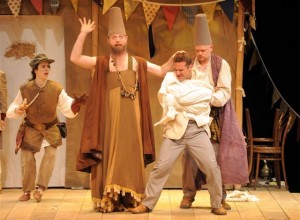 The National Theatre’s digitally-projected production of Hamlet with Rory Kinnear is an example of artistic interpretation of the highest order. It is now time for the Globe to bring us a production of that caliber, preferably a history or tragedy. This production left me wearied and craving the power of Shakespeare’s words with master classicists delivering them in person. While there is no attempt to dissuade companies from modern interpretations, I must concur with Stage and Cinema’s Harvey Perr when he said, “The problem is that everyone’s afraid to do Shakespeare straight. To just do the play and still come up with some interesting overview that makes you feel as if you’re seeing the play for the first time. The Comedy of Errors may not be Shakespeare’s best comedy but there’s a wealth of genuine laughter to be found in it if it were just done as written.”
The National Theatre’s digitally-projected production of Hamlet with Rory Kinnear is an example of artistic interpretation of the highest order. It is now time for the Globe to bring us a production of that caliber, preferably a history or tragedy. This production left me wearied and craving the power of Shakespeare’s words with master classicists delivering them in person. While there is no attempt to dissuade companies from modern interpretations, I must concur with Stage and Cinema’s Harvey Perr when he said, “The problem is that everyone’s afraid to do Shakespeare straight. To just do the play and still come up with some interesting overview that makes you feel as if you’re seeing the play for the first time. The Comedy of Errors may not be Shakespeare’s best comedy but there’s a wealth of genuine laughter to be found in it if it were just done as written.”
photos by Angela Weiss
The Comedy of Errors
Shakespeare’s Globe Theatre at The Broad Stage in Santa Monica
scheduled to end on November 27
for tickets, visit http://www.TheBroadStage.com
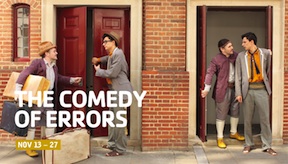

{ 2 comments… read them below or add one }
I saw the play on its opening night, and found it to be engaging and funny. It may not have been a direct recitation of the work, but it was amusing and at times extremely good. I am not sure what axe the reviewer has to grind but obviously he was not at the same performance or had drank entirely too much in the gathering prior to the show and was suffering a hang over during the show.
I recommend to everyone to go and enjoy this funny and at times hilarious performance and ignore the obvious biases of the reviewer.
For what it’s worth, I saw the show and loved it. The women were gorgeous and I did not feel that anyone was “working overtime for laughs.”
See it if you can!